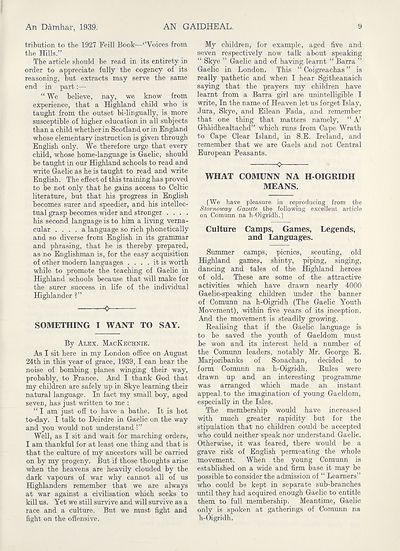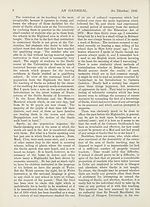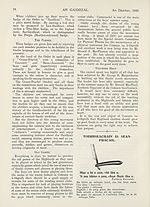Download files
Complete book:
Individual page:
Thumbnail gallery: Grid view | List view

An Damhar, 1939.
AN GAIDHEAL.
tribution to the 1927 Feill Book—‘‘Voices from
the Hills.”
The article should he read in its entirety in
order to appreciate fully the cogency of its
reasoning, but extracts may serve the same
end in part:—
“ We believe, nay, we know from
experience, that a Highland child who is
taught from the outset bi-lingually, is more
susceptible of higher education in all subjects
than a child whether in Scotland or in England
whose elementary instruction is given through
English only. We therefore urge that every
child, whose home-language is Gaelic, should
be taught in our Highland schools to read and
write Gaelic as he is taught to read and write
English. The effect of this training has proved
to be not only that he gains access to Celtic
literature, but that his progress in English
becomes surer and speedier, and his intellec¬
tual grasp becomes wider and stronger ....
his second language is to him a living verna¬
cular .... a language so rich phonetically
and so diverse from English in its grammar
and phrasing, that he is thereby prepared,
as no Englishman is, for the easy acquisition
of other modern languages .... it is worth
while to promote the teaching of Gaelic in
Highland schools because that will make for
the surer success in life of the individual
Highlander ?”
$
SOMETHING I WANT TO SAY.
By Alex. MacKechnie.
As I sit here in my London office on August
24th in this year of grace, 1939, I can hear the
noise of bombing planes winging their way,
probably, to France. And I thank God that
my children are safely up in Skye learning their
natural language. In fact my small boy, aged
seven, has just written to me :
“ I am just off to have a bathe. It is hot
to-day. I talk to Deirdre in Gaelic on the way
and you would not understand!”
Well, as I sit and wait for marching orders,
I am thankful for at least one thing and that is
that the culture of my ancestors will be carried
on by my progeny. But if those thoughts arise
when the heavens are heavily clouded by the
dark vapours of war why cannot all of us
Highlanders remember that we are always
at war against a civilisation which seeks to
kill us. Yet we still survive and will survive as a
race and a culture. But we must fight and
fight on the offensive.
My children, for example, aged five and
seven respectively now talk about speaking
“ Skye ” Gaelic and of having learnt “ Barra ”
Gaelic in London. This “ Coigreachas ” is
really pathetic and when I hear Sgitheanaich
saying that the prayers my children have
learnt from a Barra girl are unintelligible I
write, In the name of Heaven let us forget Islay,
Jura, Skye, and Eilean Fada, and remember
that one thing that matters namely, “ A’
Ghaidhealtachd” which runs from Cape Wrath
to Cape Clear Island, in S.E. Ireland, and
remember that we are Gaels and not Central
European Peasants.
0
WHAT COMUNN NA H-OIGRIDH
MEANS.
[We have pleasure in reproducing from the
Stornoway Gazette the following excellent article
on Comunn na h-Oigridh.]
Culture Camps, Games, Legends,
and Languages.
Summer camps, picnics, scouting, old
Highland games, shinty, piping, singing,
dancing and tales of the Highland heroes
of old. These are some of the attractive
activities which have drawn nearly 4000
Gaelic-speaking children under the banner
of Comunn na h-Oigridh (The Gaelic Youth
Movement), within five years of its inception.
And the movement is steadily growing.
Realising that if the Gaelic language is
to be saved the youth of Gaeldom must
be won and its interest held a number of
the Comunn leaders, notably Mr. George E.
Marjoribanks of Sonachan, decided to
form Comunn na h-Oigridh. Rules were
drawn up and an interesting programme
was arranged which made an instant
appeal.to the imagination of young Gaeldom,
especially in the Isles.
The membership Would have increased
with much greater rapidity but for the
stipulation that no children could be accepted
who could neither speak nor understand Gaelic.
Otherwise, it was feared, there would be a
grave risk of English permeating the whole
movement. When the young Comunn is
established on a wide and firm base it may be
possible to consider the admission of “ Learners”
who could be kept in separate sub-branches
until they had acquired enough Gaelic to entitle
them to full membership. Meantime, Gaelic
only is spoken at gatherings of Comunn na
h-Oigridh.
AN GAIDHEAL.
tribution to the 1927 Feill Book—‘‘Voices from
the Hills.”
The article should he read in its entirety in
order to appreciate fully the cogency of its
reasoning, but extracts may serve the same
end in part:—
“ We believe, nay, we know from
experience, that a Highland child who is
taught from the outset bi-lingually, is more
susceptible of higher education in all subjects
than a child whether in Scotland or in England
whose elementary instruction is given through
English only. We therefore urge that every
child, whose home-language is Gaelic, should
be taught in our Highland schools to read and
write Gaelic as he is taught to read and write
English. The effect of this training has proved
to be not only that he gains access to Celtic
literature, but that his progress in English
becomes surer and speedier, and his intellec¬
tual grasp becomes wider and stronger ....
his second language is to him a living verna¬
cular .... a language so rich phonetically
and so diverse from English in its grammar
and phrasing, that he is thereby prepared,
as no Englishman is, for the easy acquisition
of other modern languages .... it is worth
while to promote the teaching of Gaelic in
Highland schools because that will make for
the surer success in life of the individual
Highlander ?”
$
SOMETHING I WANT TO SAY.
By Alex. MacKechnie.
As I sit here in my London office on August
24th in this year of grace, 1939, I can hear the
noise of bombing planes winging their way,
probably, to France. And I thank God that
my children are safely up in Skye learning their
natural language. In fact my small boy, aged
seven, has just written to me :
“ I am just off to have a bathe. It is hot
to-day. I talk to Deirdre in Gaelic on the way
and you would not understand!”
Well, as I sit and wait for marching orders,
I am thankful for at least one thing and that is
that the culture of my ancestors will be carried
on by my progeny. But if those thoughts arise
when the heavens are heavily clouded by the
dark vapours of war why cannot all of us
Highlanders remember that we are always
at war against a civilisation which seeks to
kill us. Yet we still survive and will survive as a
race and a culture. But we must fight and
fight on the offensive.
My children, for example, aged five and
seven respectively now talk about speaking
“ Skye ” Gaelic and of having learnt “ Barra ”
Gaelic in London. This “ Coigreachas ” is
really pathetic and when I hear Sgitheanaich
saying that the prayers my children have
learnt from a Barra girl are unintelligible I
write, In the name of Heaven let us forget Islay,
Jura, Skye, and Eilean Fada, and remember
that one thing that matters namely, “ A’
Ghaidhealtachd” which runs from Cape Wrath
to Cape Clear Island, in S.E. Ireland, and
remember that we are Gaels and not Central
European Peasants.
0
WHAT COMUNN NA H-OIGRIDH
MEANS.
[We have pleasure in reproducing from the
Stornoway Gazette the following excellent article
on Comunn na h-Oigridh.]
Culture Camps, Games, Legends,
and Languages.
Summer camps, picnics, scouting, old
Highland games, shinty, piping, singing,
dancing and tales of the Highland heroes
of old. These are some of the attractive
activities which have drawn nearly 4000
Gaelic-speaking children under the banner
of Comunn na h-Oigridh (The Gaelic Youth
Movement), within five years of its inception.
And the movement is steadily growing.
Realising that if the Gaelic language is
to be saved the youth of Gaeldom must
be won and its interest held a number of
the Comunn leaders, notably Mr. George E.
Marjoribanks of Sonachan, decided to
form Comunn na h-Oigridh. Rules were
drawn up and an interesting programme
was arranged which made an instant
appeal.to the imagination of young Gaeldom,
especially in the Isles.
The membership Would have increased
with much greater rapidity but for the
stipulation that no children could be accepted
who could neither speak nor understand Gaelic.
Otherwise, it was feared, there would be a
grave risk of English permeating the whole
movement. When the young Comunn is
established on a wide and firm base it may be
possible to consider the admission of “ Learners”
who could be kept in separate sub-branches
until they had acquired enough Gaelic to entitle
them to full membership. Meantime, Gaelic
only is spoken at gatherings of Comunn na
h-Oigridh.
Set display mode to:
![]() Universal Viewer |
Universal Viewer | ![]() Mirador |
Large image | Transcription
Mirador |
Large image | Transcription
| An Comunn Gàidhealach > An Comunn Gàidhealach Publications > Gaidheal > Volume 35, October 1939--September 1940 > (17) Page 9 |
|---|
| Permanent URL | https://digital.nls.uk/125143388 |
|---|
| Description | This contains items published by An Comunn, which are not specifically Mòd-related. It includes journals, annual reports and corporate documents, policy statements, educational resources and published plays and literature. It is arranged alphabetically by title. |
|---|
| Description | A collection of over 400 items published by An Comunn Gàidhealach, the organisation which promotes Gaelic language and culture and organises the Royal National Mòd. Dating from 1891 up to the present day, the collection includes journals and newspapers, annual reports, educational materials, national Mòd programmes, published Mòd literature and music. |
|---|---|
| Additional NLS resources: |
|

